外研版(2019)必修第一册Unit 6 At one with nature Using language 课件(共25张PPT,内嵌视频)
文档属性
| 名称 | 外研版(2019)必修第一册Unit 6 At one with nature Using language 课件(共25张PPT,内嵌视频) | 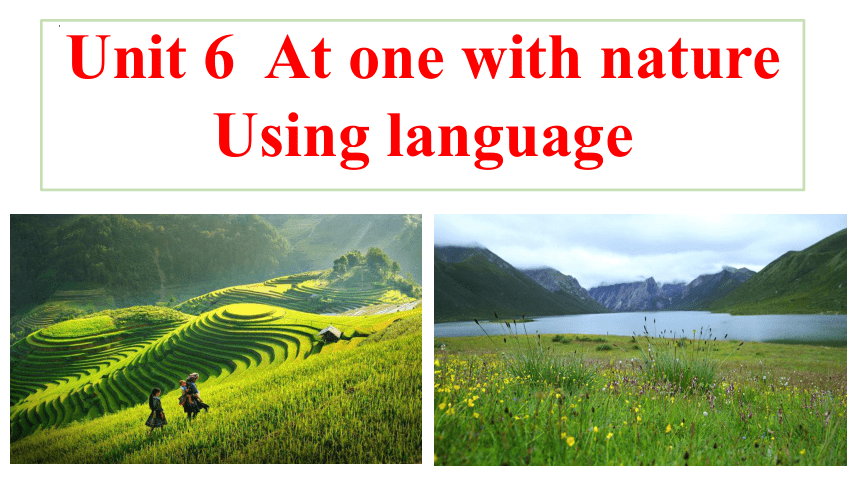 | |
| 格式 | pptx | ||
| 文件大小 | 119.9MB | ||
| 资源类型 | 教案 | ||
| 版本资源 | 外研版(2019) | ||
| 科目 | 英语 | ||
| 更新时间 | 2023-07-17 19:24:09 | ||
图片预览

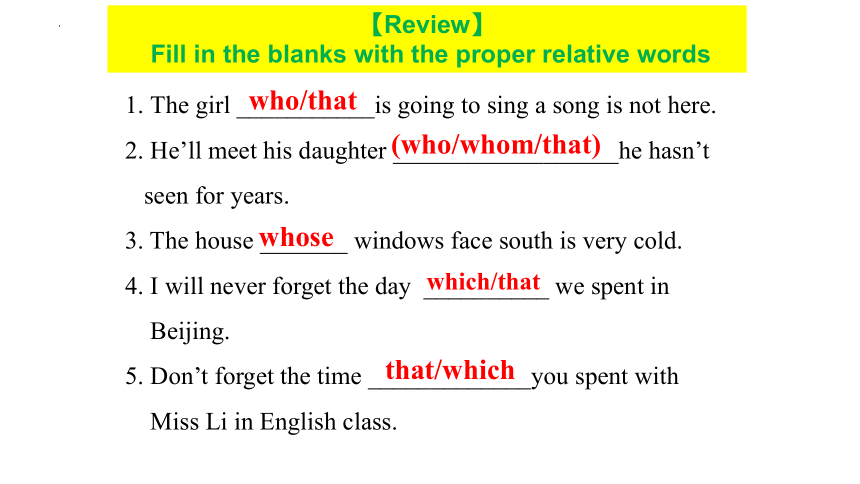
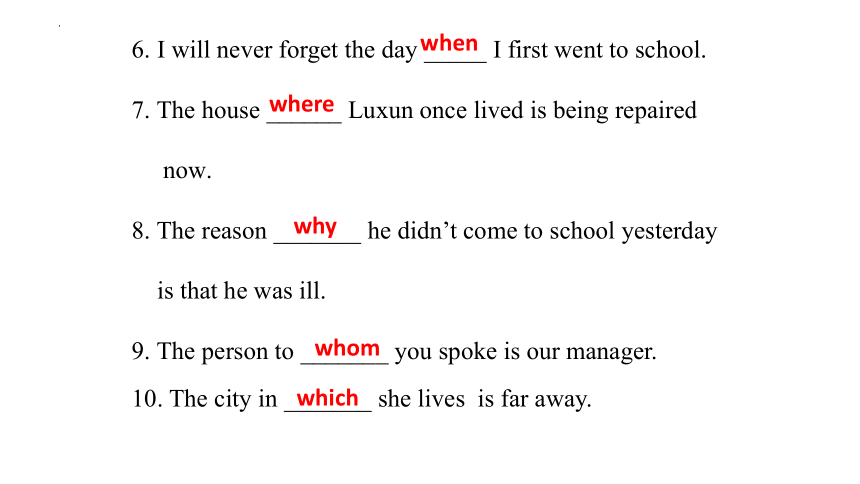
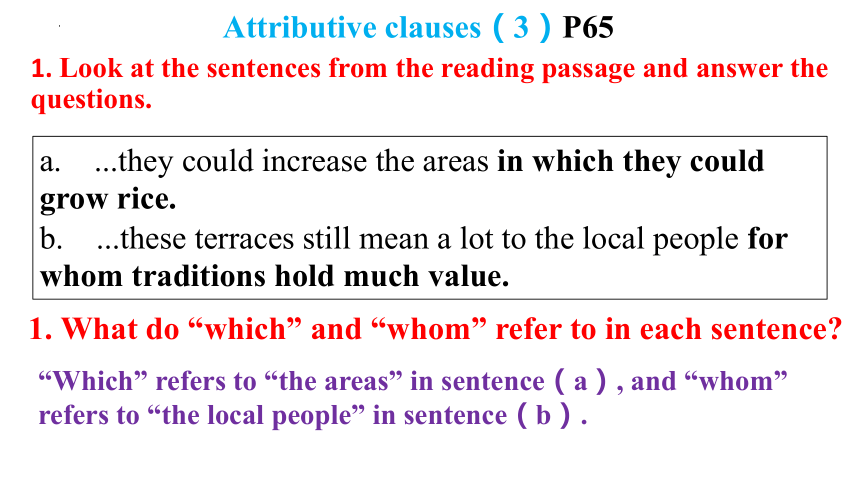
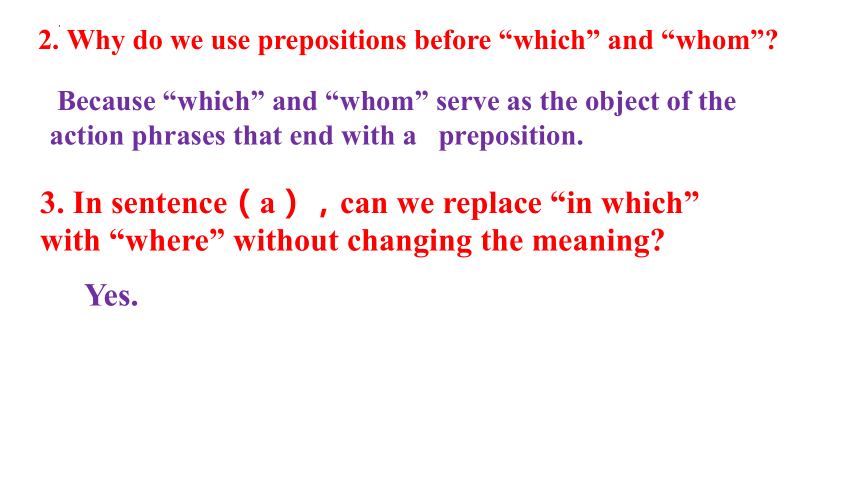
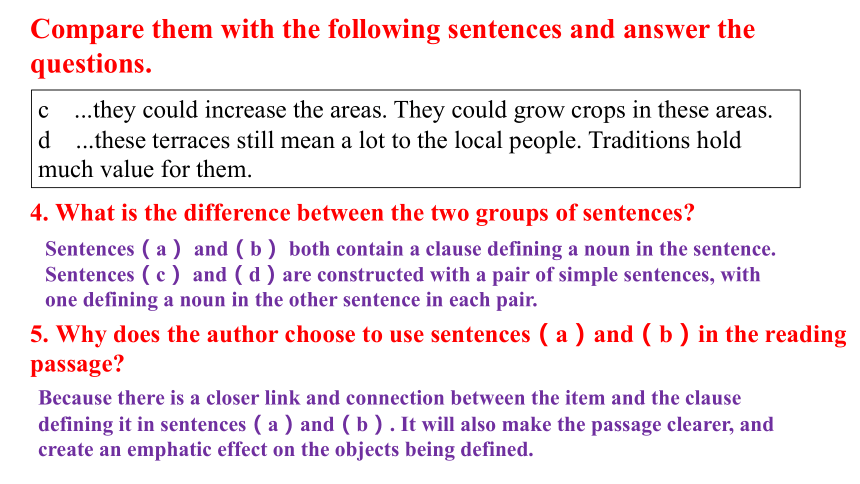
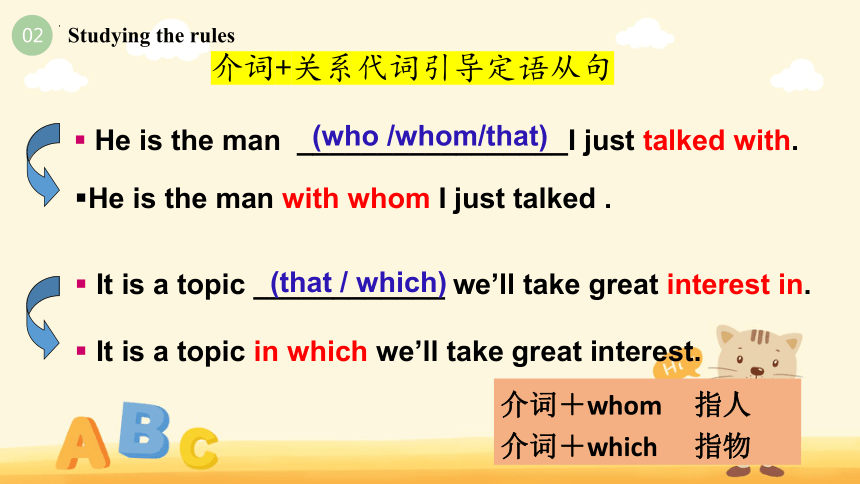
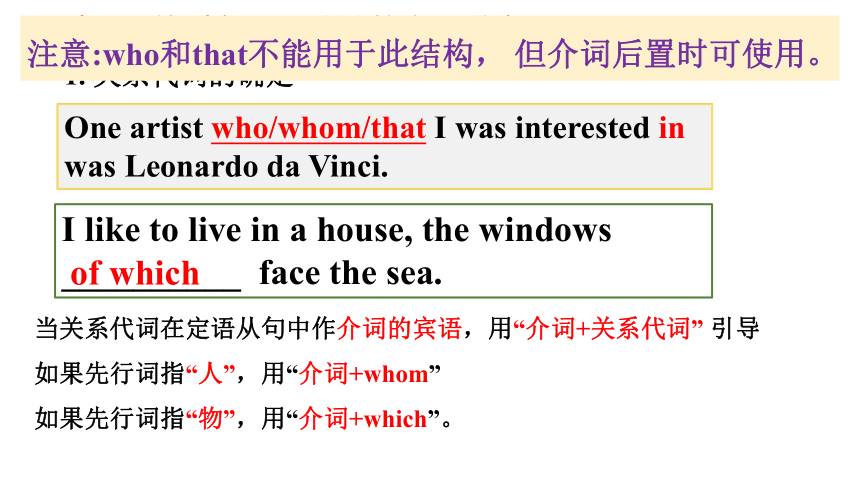
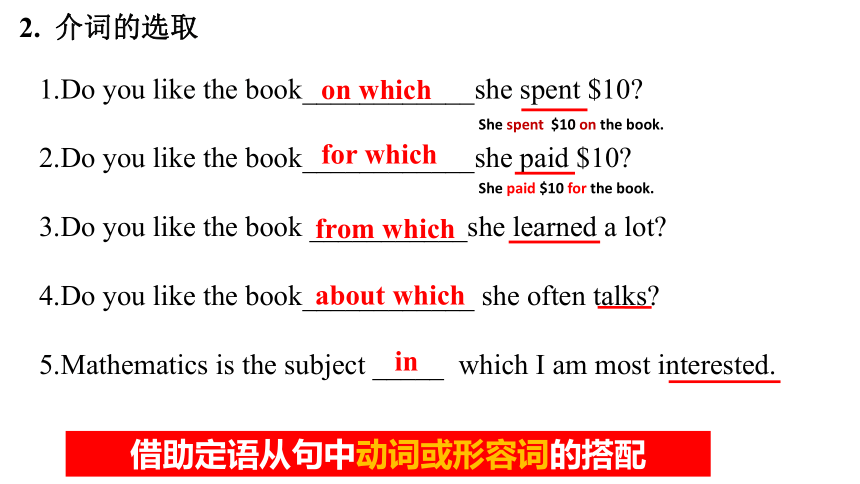
文档简介
(共25张PPT)
Unit 6 At one with nature
Using language
【Review】
Fill in the blanks with the proper relative words
1. The girl ___________is going to sing a song is not here.
2. He’ll meet his daughter __________________he hasn’t
seen for years.
3. The house _______ windows face south is very cold.
4. I will never forget the day __________ we spent in
Beijing.
5. Don’t forget the time _____________you spent with
Miss Li in English class.
who/that
(who/whom/that)
whose
that/which
which/that
6. I will never forget the day _____ I first went to school.
7. The house ______ Luxun once lived is being repaired
now.
8. The reason _______ he didn’t come to school yesterday
is that he was ill.
9. The person to _______ you spoke is our manager.
10. The city in _______ she lives is far away.
when
where
why
whom
which
Attributive clauses(3)P65
1. Look at the sentences from the reading passage and answer the questions.
a. ...they could increase the areas in which they could grow rice.
b. ...these terraces still mean a lot to the local people for whom traditions hold much value.
1. What do “which” and “whom” refer to in each sentence
“Which” refers to “the areas” in sentence(a), and “whom” refers to “the local people” in sentence(b).
2. Why do we use prepositions before “which” and “whom”
Because “which” and “whom” serve as the object of the action phrases that end with a preposition.
3. In sentence(a),can we replace “in which” with “where” without changing the meaning
Yes.
Compare them with the following sentences and answer the questions.
c ...they could increase the areas. They could grow crops in these areas.
d ...these terraces still mean a lot to the local people. Traditions hold much value for them.
4. What is the difference between the two groups of sentences
5. Why does the author choose to use sentences(a)and(b)in the reading passage
Sentences(a) and(b) both contain a clause defining a noun in the sentence. Sentences(c) and(d)are constructed with a pair of simple sentences, with one defining a noun in the other sentence in each pair.
Because there is a closer link and connection between the item and the clause defining it in sentences(a)and(b). It will also make the passage clearer, and
create an emphatic effect on the objects being defined.
He is the man _________________I just talked with.
(who /whom/that)
He is the man with whom I just talked .
It is a topic ____________ we’ll take great interest in.
It is a topic in which we’ll take great interest.
(that / which)
介词+whom 指人
介词+which 指物
介词+关系代词引导定语从句
02
Studying the rules
1. 关系代词的确定
当关系代词在定语从句中作介词的宾语,用“介词+关系代词” 引导
如果先行词指“人”,用“介词+whom”
如果先行词指“物”,用“介词+which”。
“介词+关系代词” 引导的定语从句
注意:who和that不能用于此结构, 但介词后置时可使用。
One artist ____________I was interested was Leonardo da Vinci.
in whom
I like to live in a house, the windows __________ face the sea.
of which
One artist who/whom/that I was interested in was Leonardo da Vinci.
1.Do you like the book____________she spent $10
2.Do you like the book____________she paid $10
3.Do you like the book ___________she learned a lot
4.Do you like the book____________ she often talks
5.Mathematics is the subject _____ which I am most interested.
on which
for which
from which
about which
借助定语从句中动词或形容词的搭配
in
2. 介词的选取
She paid $10 for the book.
She spent $10 on the book.
1. I’ll remember the day _____ which I visited Beijing.
2. The moment _____which I made the decision is
exciting.
3. This is the classroom _____which we studied last year.
4. I’ll never forget the time ______ which I spent my
childhood in the country.
on
at
in
Inquiry learning
during
借助与先行词的搭配
Conclusion
1. My computer, ________ which I can’t surf the
Internet, broke down yesterday.
2. This is the pilot _______whom my son was saved.
3. This is the pilot _______whom my brother has
worked for ten years.
4.The film _______which I fell asleep was very
boring.
without
by
with
Inquiry learning
during
借助从句的句意
Conclusion
1. The man _________ I spoke on the phone last
night is very good at writing.
2. The musicians _________ we have great interest
toured Europe with us.
3. Do you like the book ___________ she often talks
4. Glasses, ______________ I can’t see clearly, are
really important for me.
5. China is a beautiful country, ___________ we are
proud.
6. Do you remember the day _______ you joined our
club
Fill in each blank with a proper prep.+ whom/which
to whom
in whom
about which
without which
of which
on which
跟踪训练 1
2. 介词的选取
确定关系代词前的介词的方法:
1) 了解先行词和定语从句的含义。
2) 看从句的动词或形容词与先行词的固定搭配。
1. The man _________ I share the room is a young teacher fresh from college.
2. My brother loves books ___________ he spends almost all his money.
with whom
on which
3. 特殊用法
(1)表示“整体和部分关系”,介词常用of。在some、any、none、
any、few、all、both、most等代词或数词前或后可用of which/whom。
Just now Tom told me three funny stories,two of which he had told me twice before.
These terraces also provide a perfect environment for birds
and fish, some of which feed on insects that can harm the rice crops.
不定代词 + of + which/whom
(2)当先行词为way,并且定语从句中缺少状语时,通常用that/in which/ 不填。
Can you tell the way in which/that he did this experiment.
2. Connect the sentences with a preposition + whom/which.
1. The Zhuang is an ethnic group. Its population is the largest of all ethnic groups in China.
2. Guangxi is a province. The Longji Rice Terraces are located in it.
The Zhuang is an ethnic group of which the population is the largest of all ethnic groups in China.
Guangxi is a province in which the Longji Rice Terraces are located.
3. I want to visit this cultural landscape. The title of UNESCO World Heritage Site was given to it in 2016.
4. He is an expert on rice planting. The local Zhuang people have learnt a lot from him.
I want to visit this cultural landscape to which the title of UNESCO World Heritage Site was given in 2016.
He is an expert on rice planting from whom the local Zhuang people have learnt a lot.
Do you know him
Let’s know something about him.
https://www./discovery/item/60cc7383000000000101f1d8 source=question
https://www./video/BV1nR4y137L9/ spm_id_from=333.337.search-card.all.click
3. Complete the passage with a preposition + whom/which.
Among the many beautiful treasures people can receive from nature are natural dyes. The most common natural source 1 _____________ natural dyes come is plants. Materials for making natural dyes can often be found in gardens 2 __ colourful flowers are planted. Other natural dyes are made from insects, sea creatures and mineral compounds.
Natural dyes are now returning to popularity,especially with artists and craftspeople. The reasons 3 they prefer natural dyes are that the colours are brighter and can be kept longer. Natural dyes are also becoming more popular with consumers4____________ caring for the environment is a priority. More and more people feel that by using natural dyes, we can remind ourselves of nature’s beauty and protect the natural world.
from which
in which
for which
for whom
natural dyes
mineral compounds
popularity
craftspeople
priority
remind sb of sth
天然植物染料
无机化合物
n. 人气---popular adj.
enjoy great popularity
享有盛誉;广受欢迎
n.手艺人;工匠
n.优先权---prior adj.优先的
提醒某人某事
用适当的介词填空
1. Where is the supermarket_________which you bought the laptop last week
2. Do you remember the day_________which you joined our club.
3. I don't know the reason__________which he said no.
4.The picture_________which he paid $100 was once owned by a king.
5. This is Tow Sawyer, __________which his teacher is proud.
6. Can you think of a situation________which this word can be used
on
for
for
of
in
in
04
Exercise
7. I'm grateful to him for that advice, ___________ which I owed all my success.
8. They finally climbed up the mountains, ___________which many strange birds were seen.
9. These are books written by Mark Twin, one_________which was read to me by ma father.
10. She has many books, none__________which is interesting.
to
on
of
of
04
Exercise
Homework
Finish 《定语从句专项训练3》
Unit 6 At one with nature
Using language
【Review】
Fill in the blanks with the proper relative words
1. The girl ___________is going to sing a song is not here.
2. He’ll meet his daughter __________________he hasn’t
seen for years.
3. The house _______ windows face south is very cold.
4. I will never forget the day __________ we spent in
Beijing.
5. Don’t forget the time _____________you spent with
Miss Li in English class.
who/that
(who/whom/that)
whose
that/which
which/that
6. I will never forget the day _____ I first went to school.
7. The house ______ Luxun once lived is being repaired
now.
8. The reason _______ he didn’t come to school yesterday
is that he was ill.
9. The person to _______ you spoke is our manager.
10. The city in _______ she lives is far away.
when
where
why
whom
which
Attributive clauses(3)P65
1. Look at the sentences from the reading passage and answer the questions.
a. ...they could increase the areas in which they could grow rice.
b. ...these terraces still mean a lot to the local people for whom traditions hold much value.
1. What do “which” and “whom” refer to in each sentence
“Which” refers to “the areas” in sentence(a), and “whom” refers to “the local people” in sentence(b).
2. Why do we use prepositions before “which” and “whom”
Because “which” and “whom” serve as the object of the action phrases that end with a preposition.
3. In sentence(a),can we replace “in which” with “where” without changing the meaning
Yes.
Compare them with the following sentences and answer the questions.
c ...they could increase the areas. They could grow crops in these areas.
d ...these terraces still mean a lot to the local people. Traditions hold much value for them.
4. What is the difference between the two groups of sentences
5. Why does the author choose to use sentences(a)and(b)in the reading passage
Sentences(a) and(b) both contain a clause defining a noun in the sentence. Sentences(c) and(d)are constructed with a pair of simple sentences, with one defining a noun in the other sentence in each pair.
Because there is a closer link and connection between the item and the clause defining it in sentences(a)and(b). It will also make the passage clearer, and
create an emphatic effect on the objects being defined.
He is the man _________________I just talked with.
(who /whom/that)
He is the man with whom I just talked .
It is a topic ____________ we’ll take great interest in.
It is a topic in which we’ll take great interest.
(that / which)
介词+whom 指人
介词+which 指物
介词+关系代词引导定语从句
02
Studying the rules
1. 关系代词的确定
当关系代词在定语从句中作介词的宾语,用“介词+关系代词” 引导
如果先行词指“人”,用“介词+whom”
如果先行词指“物”,用“介词+which”。
“介词+关系代词” 引导的定语从句
注意:who和that不能用于此结构, 但介词后置时可使用。
One artist ____________I was interested was Leonardo da Vinci.
in whom
I like to live in a house, the windows __________ face the sea.
of which
One artist who/whom/that I was interested in was Leonardo da Vinci.
1.Do you like the book____________she spent $10
2.Do you like the book____________she paid $10
3.Do you like the book ___________she learned a lot
4.Do you like the book____________ she often talks
5.Mathematics is the subject _____ which I am most interested.
on which
for which
from which
about which
借助定语从句中动词或形容词的搭配
in
2. 介词的选取
She paid $10 for the book.
She spent $10 on the book.
1. I’ll remember the day _____ which I visited Beijing.
2. The moment _____which I made the decision is
exciting.
3. This is the classroom _____which we studied last year.
4. I’ll never forget the time ______ which I spent my
childhood in the country.
on
at
in
Inquiry learning
during
借助与先行词的搭配
Conclusion
1. My computer, ________ which I can’t surf the
Internet, broke down yesterday.
2. This is the pilot _______whom my son was saved.
3. This is the pilot _______whom my brother has
worked for ten years.
4.The film _______which I fell asleep was very
boring.
without
by
with
Inquiry learning
during
借助从句的句意
Conclusion
1. The man _________ I spoke on the phone last
night is very good at writing.
2. The musicians _________ we have great interest
toured Europe with us.
3. Do you like the book ___________ she often talks
4. Glasses, ______________ I can’t see clearly, are
really important for me.
5. China is a beautiful country, ___________ we are
proud.
6. Do you remember the day _______ you joined our
club
Fill in each blank with a proper prep.+ whom/which
to whom
in whom
about which
without which
of which
on which
跟踪训练 1
2. 介词的选取
确定关系代词前的介词的方法:
1) 了解先行词和定语从句的含义。
2) 看从句的动词或形容词与先行词的固定搭配。
1. The man _________ I share the room is a young teacher fresh from college.
2. My brother loves books ___________ he spends almost all his money.
with whom
on which
3. 特殊用法
(1)表示“整体和部分关系”,介词常用of。在some、any、none、
any、few、all、both、most等代词或数词前或后可用of which/whom。
Just now Tom told me three funny stories,two of which he had told me twice before.
These terraces also provide a perfect environment for birds
and fish, some of which feed on insects that can harm the rice crops.
不定代词 + of + which/whom
(2)当先行词为way,并且定语从句中缺少状语时,通常用that/in which/ 不填。
Can you tell the way in which/that he did this experiment.
2. Connect the sentences with a preposition + whom/which.
1. The Zhuang is an ethnic group. Its population is the largest of all ethnic groups in China.
2. Guangxi is a province. The Longji Rice Terraces are located in it.
The Zhuang is an ethnic group of which the population is the largest of all ethnic groups in China.
Guangxi is a province in which the Longji Rice Terraces are located.
3. I want to visit this cultural landscape. The title of UNESCO World Heritage Site was given to it in 2016.
4. He is an expert on rice planting. The local Zhuang people have learnt a lot from him.
I want to visit this cultural landscape to which the title of UNESCO World Heritage Site was given in 2016.
He is an expert on rice planting from whom the local Zhuang people have learnt a lot.
Do you know him
Let’s know something about him.
https://www./discovery/item/60cc7383000000000101f1d8 source=question
https://www./video/BV1nR4y137L9/ spm_id_from=333.337.search-card.all.click
3. Complete the passage with a preposition + whom/which.
Among the many beautiful treasures people can receive from nature are natural dyes. The most common natural source 1 _____________ natural dyes come is plants. Materials for making natural dyes can often be found in gardens 2 __ colourful flowers are planted. Other natural dyes are made from insects, sea creatures and mineral compounds.
Natural dyes are now returning to popularity,especially with artists and craftspeople. The reasons 3 they prefer natural dyes are that the colours are brighter and can be kept longer. Natural dyes are also becoming more popular with consumers4____________ caring for the environment is a priority. More and more people feel that by using natural dyes, we can remind ourselves of nature’s beauty and protect the natural world.
from which
in which
for which
for whom
natural dyes
mineral compounds
popularity
craftspeople
priority
remind sb of sth
天然植物染料
无机化合物
n. 人气---popular adj.
enjoy great popularity
享有盛誉;广受欢迎
n.手艺人;工匠
n.优先权---prior adj.优先的
提醒某人某事
用适当的介词填空
1. Where is the supermarket_________which you bought the laptop last week
2. Do you remember the day_________which you joined our club.
3. I don't know the reason__________which he said no.
4.The picture_________which he paid $100 was once owned by a king.
5. This is Tow Sawyer, __________which his teacher is proud.
6. Can you think of a situation________which this word can be used
on
for
for
of
in
in
04
Exercise
7. I'm grateful to him for that advice, ___________ which I owed all my success.
8. They finally climbed up the mountains, ___________which many strange birds were seen.
9. These are books written by Mark Twin, one_________which was read to me by ma father.
10. She has many books, none__________which is interesting.
to
on
of
of
04
Exercise
Homework
Finish 《定语从句专项训练3》
